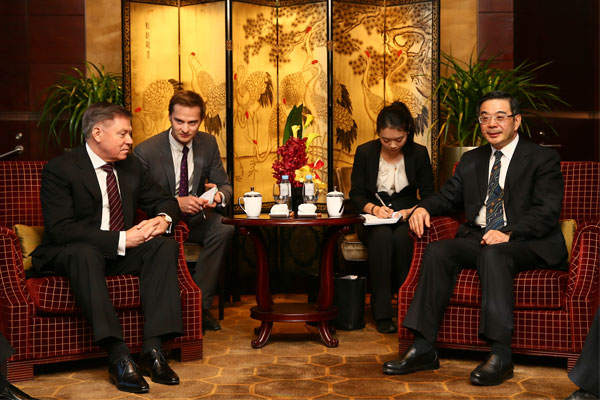Zhou Qiang meets his Russian counterpart

Zhou Qiang (front right), president of the Supreme People’s Court, meets with his Russian counterpart Vyacheslav Lebedev (front left) in Beijing, on Feb 28. [Photo by Sun Ruofeng/chinacourt.org]
Zhou Qiang, president of the Supreme People’s Court (SPC), China’s top court, met with Russia’s Supreme Court President Vyacheslav Lebedev in Beijing, on Feb 28.
After extending his warm welcome, Zhou introduced China’s progress in implementing rule of law and enhancing its court system.
He said that this year is the start of the decisive phase of the country’s development for building a well-off society in an all-round way, and that during the 13th Five-year Plan (2016-20) period courts at all levels will pursue the goal of China’s rule of law – “letting the people feel fairness and justice in every single case”. They will also focus on risk prevention and control as well as the role of courts in development, try to solve difficult problems and make improvements on the judicial system.
Chinese courts are making progress in reform and in building a fair, efficient and credible socialist judicial system. They hope to remove obstacles that hinder fairness and restrict judicial capacity, and meet people’s increasing and diverse demands for judicial services, Zhou noted.
He said China and Russia have kept close ties in the judicial field. Exchanges between their judicial offices have deepened over the years, and they have conducted fruitful cooperation within multilateral frameworks such as the Shanghai Cooperation Organization and the BRICS (Brazil, Russia, India, China and South Africa).
Zhou expressed his hope that courts in the two countries will enhance exchanges and learn from each other, as well as continue to deepen cooperation in all fields, in order to help further develop the comprehensive strategic partnership between China and Russia.
Lebedev introduced the rule of law and court functions in Russia. He said the Russian Supreme Court will work to improve mutual understanding and exchange between the two countries’ judicial communities.







